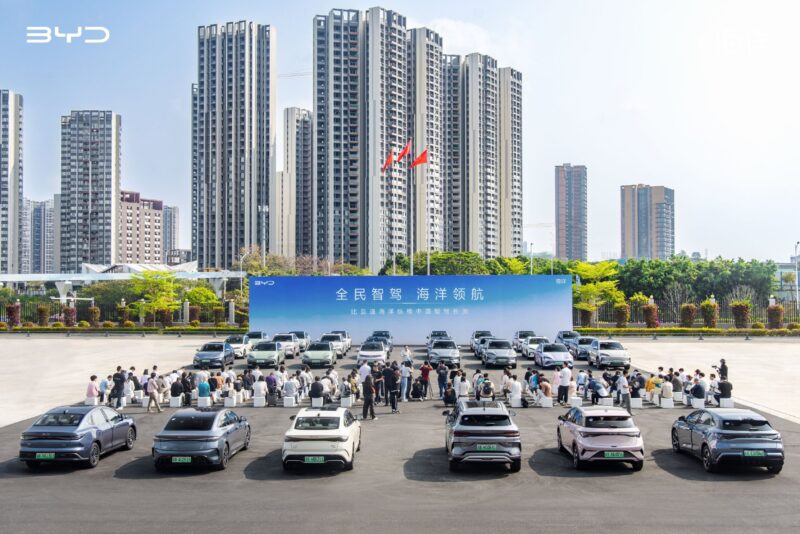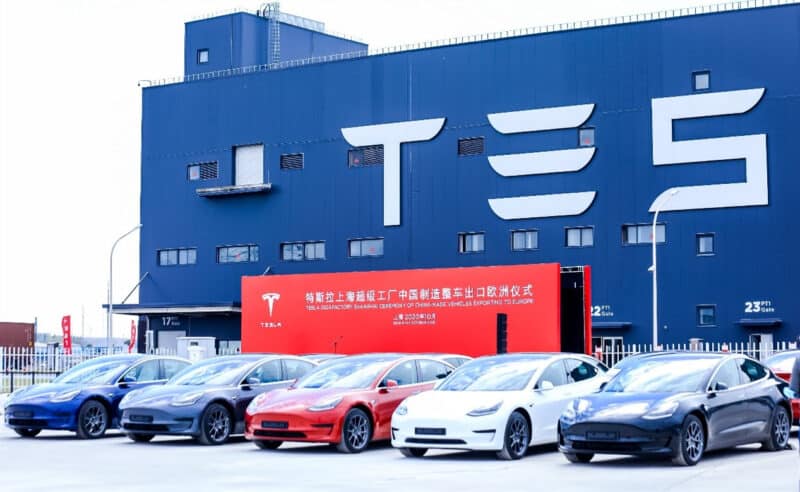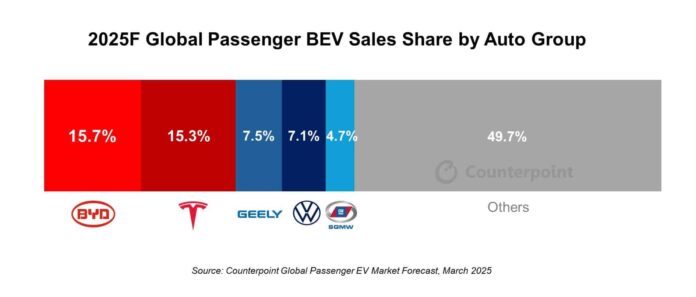BYD has secured its position as the world’s top electric vehicle manufacturer for the second consecutive quarter, confirming a dramatic shift in the global EV landscape that analysts now project will extend through 2025. According to newly released sales figures and Counterpoint Research forecasts, BYD’s aggressive expansion strategy and technological innovations have successfully challenged Tesla’s long-held dominance.

The Chinese automaker delivered 416,388 passenger BEVs in Q1 2025, outpacing Tesla’s 336,681 units for the same period. This follows BYD’s Q4 2024 breakthrough, when it delivered 595,413 BEVs compared to Tesla’s 495,570.

BYD’s quarterly pure electric vehicle sales surpassed Tesla’s for the first time in Q4 2023, with 595,413 sales compared to Tesla’s 484,507 deliveries. However, this trend reversed in the next quarter, with Tesla slightly outperforming BYD in full-year sales. BYD’s BEV sales reached 1,764,992 in 2024, while Tesla’s sales totaled 1,789,226.
“BYD is projected to overtake Tesla for the first time as the world’s leading battery electric vehicle brand in 2025, capturing a 15.7% global market share,” according to Counterpoint Research’s latest Global Passenger EV Forecast. “The milestone reflects BYD’s aggressive expansion enabled by its tech leadership and vertically integrated production model, all bolstered by strong domestic policy support.”
A key factor in BYD’s ascendancy is its recently unveiled ultra-fast charging system, representing a significant leap in BEV performance. The system features a 1,000V electrical architecture, 10C charging rate batteries, silicon carbide power chips, and the company’s proprietary Blade Battery technology.
“The system can deliver 400 km of range in just 5 minutes, setting a new industry benchmark, far outpacing Tesla’s Supercharger, which adds about 275 km in 10 minutes,” noted Abhik Mukherjee, Research Analyst at Counterpoint. “This technological leap is expected to significantly ease consumer concerns around charging time and boost EV adoption by reducing charging anxiety.”
Meanwhile, Tesla faces mounting challenges on multiple fronts. CEO Elon Musk’s controversial political positioning has triggered consumer backlash in key markets, with early 2025 data showing softening sales in the U.S. and Europe. Geopolitical tensions, including escalating U.S.-China trade disputes and increased tariffs on Chinese EV components, further disrupt Tesla’s supply chain.

“CEO Elon Musk has scored somewhat of an own goal against Tesla, and we are about to glimpse how much the company’s sales were hurt in Q1 2025,” said Counterpoint Associate Director Liz Lee. “This is a big opportunity for BYD, and if they deliver on the fast-charging promise, this could be the turning point for BYD and the global China BEV story.”
BYD’s vertical integration—controlling everything from batteries and motors to electronic systems through its subsidiaries—provides significant cost advantages and operational efficiencies. This end-to-end control enables BYD to offer competitively priced vehicles without sacrificing margins, further reinforcing its market leadership position as it continues its global expansion.
The company’s rise represents not just a challenge to Tesla but signals a broader shift in the global automotive industry, with Chinese manufacturers increasingly setting the pace for innovation and scale in the electric vehicle segment.


